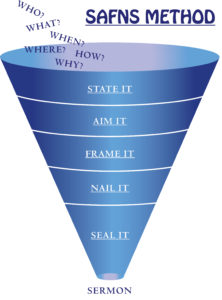 A modern Olympic pentathlon combines five sports into one. An athlete completes all five sports in a single day. The first three sports are fencing, freestyle swimming, and equestrian show jumping. The final two sports combine pistol shooting and running into one event. An athlete must balance her efforts to achieve the highest total score which means that sometimes she must avoid pushing to win in one event to focus on a later event. The total score of all five events is all that matters to win Olympic gold.
A modern Olympic pentathlon combines five sports into one. An athlete completes all five sports in a single day. The first three sports are fencing, freestyle swimming, and equestrian show jumping. The final two sports combine pistol shooting and running into one event. An athlete must balance her efforts to achieve the highest total score which means that sometimes she must avoid pushing to win in one event to focus on a later event. The total score of all five events is all that matters to win Olympic gold.Preachers must adopt a pentathlon strategy for sermons. All that matters is the moment when the preacher delivers truth to people. Daniel Gregory recently wrote two articles in which he applied the analogy of competing in a pentathlon to the process of moving from text to sermon. The five elements of sermon construction that he used were content, style, structure, rhetorical devices and orality (“The Pentathlon on Preaching Principle: A Proposed Method for Bridging the Gap Between Text and Sermon,” The Journal of the Evangelical Homiletics Society, Vol. 17, No. 2, September 2017, 19-34; see also “The Pentathlon Principle Applied,” September 2018, 21-29).

I would suggest the five elements of the SAFNS funnel. The preacher must balance these five elements to produce a good sermon as the end product. My goal is the sermon. I must not lose sight of that goal. I may be tempted to indulge in exegetical rabbit trails because I find them interesting. However, those rabbit trails may confuse the people no matter how interesting to me. My goal is to lead people to a fresh encounter with God in His Word not to establish my theological bona fides. On the other hand, I can ignore important exegetical issues in my quest to be relevant. I can be so interested in sealing the deal that I neglect the text as written or obscure the truth God intended to communicate.
STATE IT
Suppose I am preaching on Micah 6:8. “He has told you, O man, what is good; and what does the Lord require of you but to do justice, love mercy and to walk humbly with your God.” This verse is very popular in social justice movements today and easily misused by preachers. I must spend more time in my message explaining the “state it” elements of the text to ground the applications in the cultural/historical context of ancient Israel.
The nations of Israel and Judah enjoyed a booming economy not seen since the days of Solomon. The government had focused its efforts on money and security and lost its way morally and spiritually. The leaders paid lip service to the sacrificial system and the observance of all the religious rituals. They thought their prosperity was a sign of God’s blessing. Money dominated their decisions (3:9-11; 6:10-11). The prevailing philosophy was might makes right (3:1-4, 10). The government used the courts to exploit the helpless (2:2,8; 7:2-3) and to oppress widows and orphans (2:9-10). My sermon will need to spend extra time on these historical and cultural details to make sense of the verse.
NAIL IT
Perhaps my text is 1 Corinthians 10:14-22. Paul commands us to “flee from idolatry.” The context is, of course, the eating of meat sacrificed to idols which he has already defined as a matter of spiritual liberty. Yet in the end, he uses the practice to warn the Corinthians about the dangers of idolatry. In this case, my sermon will spend less time explaining the historical and cultural practices about the Temple of Aphrodite in ancient Corinth and more time on what is idolatry in our day.
Nobody in my church goes to temple feasts or buys meat from pagan temples. Now my sermon will spend more time in the “frame it” and “nail it” segments as I try to find modern applications and illustrations. Our people in the 21st century face the dangers of idolatry, and we must help them see those dangers in practical terms. A pentathlon strategy adjusts the sermon accordingly.
SEAL IT
Finally, suppose that I am preaching an evangelistic sermon on John 3:16. “For God so loved the world that He gave His only begotten Son that whoever believes in Him shall not perish but have eternal life.” My pentathlon strategy will focus on the “seal it” segment. Obviously, there is a rich heritage of theological writing about the meaning of “only begotten Son” and the mystery of the Trinity. I will not spend much time on this unless my target audience needs such an explanation. I will frame the sermon around the topics of God’s love, belief, perishing and eternal life. An evangelistic sermon aims the sermon at a call to conversion. I must frame the sermon evangelistically which requires me to spend more time on the invitation than the explanation. Sealing the deal is the point of the sermon.
A pentathlon strategy adjusts the sermon elements by the biblical text and the needs of the audience. The process of preparation is the same, but the form of the sermon will change. The moment of truth takes place when the sermon I prepared is delivered to the people I love. My pentathlon strategy focuses on that moment of truth when I seek to lead people to a fresh encounter with God through His Word.


